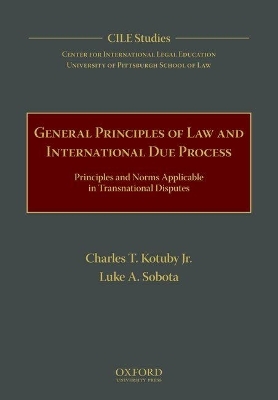
General Principles of Law and International Due Process
Oxford University Press Inc (Verlag)
978-0-19-064270-9 (ISBN)
General principles can serve as rules of decision, whether in interpreting a treaty or contract, determining causation, or ascertaining unjust enrichment. They also include a core set of procedural requirements that should be followed in any adjudicative system, such as the right to impartiality and the prohibition on fraud. Although the general principles are, by definition, basic and even rudimentary, they hold vital importance for the rule of law in international relations. They are meant not to define a rule of law, but rather the rule of law.
Charles T. Kotuby, Jr. is a partner at Jones Day in Washington D.C. His practice concentrates on litigation concerning foreign sovereigns and commercial and investment arbitration. He is a Fellow of the Chartered Institute of Arbitrators, and has for the past several years been teaching law schoold courses on international arbitration and dispute resolution. He is also a member of the Advisory Board of the Center for International Legal Education at the University of Pittsburgh School of Law, and clerked for Judge Joseph F. Weis of the United States Court of Appeals for the Third Circuit. Luke A. Sobota is a founding partner of the law firm of Three Crowns LLP, which is dedicated to international arbitration and adjudication involving both private and sovereign parties. For the past several years, Luke has taught law school courses on international arbitration and dispute resolution. He previously worked in the Office of Legal Counsel at the U.S. Department of Justice, where he advised and prepared legal opinions for executive branch officials in the areas of constitutional, international, and administrative law. He also clerked for William H. Rehnquist, the late Chief Justice of the U.S. Supreme Court.
Foreword
Acknowledgments
Preface
I. An Introduction to the General Principles of Law And International Due Process
A. The Origin and Evolution of the General Principles of Law
1. Principles That Are General
2. Principles That Are Universal
3. Typical Usage of General Principles
4. Invocations of General Principles
B. The Origin and Evolution of International Due Process
1. A Process Grounded in General Principles
2. The Concept of International Due Process
3. Specific Invocations of International Due Process
II. Modern Applications of The General Principles of Law
A. Good Faith in Contractual Relations
1. Pacta Sunt Servanda: Agreements Must Be Honored
2. Good Faith In Excusing Contractual Performance
3. Good Faith in Remedying Non-Performance
B. Abuse of Rights and the Principle of Proportionality
1. The General Prohibition on the Abuse of Rights
2. The Principle of Proportionality
C. Estoppel
D. The Prohibition on Advantageous Wrongs and Unjust Enrichment
E. Corporate Separateness and Limited Liability
F. The Principles of Causation and Reparation
G. The Principles of Responsibility and Fault
III. Modern Application of the Principles of International Due Process
A. Notice and Jurisdiction
B. Judicial Impartiality and Judicial Independence
C. Procedural Equality and the Right to be Heard
D. The Prohibition of Corruption and the Nullifying Effect of Fraud: Fraus Omnia Corrumpit
E. Evidence and Burdens of Proof
G. The Principle of Res Judicata
Epilogue
Index
| Erscheinungsdatum | 20.03.2017 |
|---|---|
| Vorwort | Stephen M. Schwebel |
| Verlagsort | New York |
| Sprache | englisch |
| Maße | 254 x 175 mm |
| Gewicht | 680 g |
| Themenwelt | Recht / Steuern ► Allgemeines / Lexika |
| Recht / Steuern ► EU / Internationales Recht | |
| ISBN-10 | 0-19-064270-X / 019064270X |
| ISBN-13 | 978-0-19-064270-9 / 9780190642709 |
| Zustand | Neuware |
| Haben Sie eine Frage zum Produkt? |
aus dem Bereich


